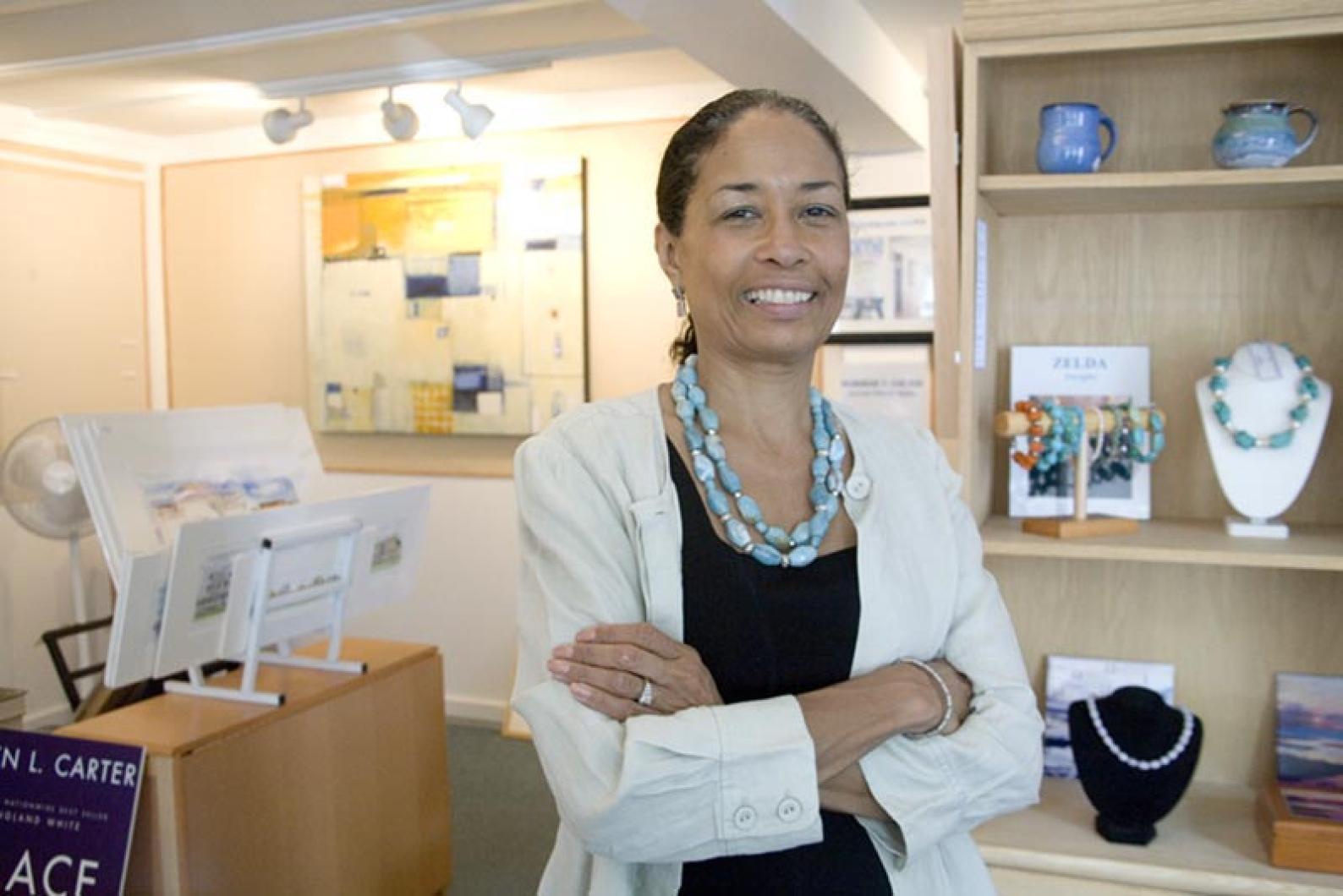Black-owned businesses on Martha’s Vineyard span its economic and cultural niches while catering to a general audience. They are inns, art galleries, boutiques and restaurants as well as service providers from real estate to holistic weight loss. But many African American business owners, year-rounders, vacationers and community leaders agree that, given the Island’s history and large African American summer population, there are not nearly enough black-owned businesses based here.
“The numbers are off,” said Natalie Dickerson, president of the Island’s National Association for the Advancement of Colored People. “If we look at the number of people of color who are here year-round and in the summer, it would be great to see the same proportion in businesses.”
According to census data from 2000, the year-round population identifying as African American is 359. But the data can’t come close to capturing the thousands of African American visitors and seasonal residents who come for the summer.
“It’s one of the biggest resorts where black folks come for vacation,” said Roger Schilling, who owns C’est La Vie on Circuit avenue.
Mr. Schilling said he saw opportunities as a black businessman in the large African American summer population when he came to the U.S. from Paris, France in 1986.
“You read about the Vineyard and the black history, you expect to see black-owned businesses,” he said.
In the second edition of his book African Americans of Martha’s Vineyard, historian Robert (Bob) C. Hayden tells of how black entrepreneurs on the Island anticipated the arrival and increase of black vacationers in the late 19th and early 20th centuries who would be barred from white-owned establishments.
“This sparked the creation of black-owned inns and food service businesses for blacks in the early decades of the 1900s,” Mr. Hayden writes.
When asked about black-owned businesses on the Island, many African Americans suggest that their discontent in the low numbers — only four retail businesses in Oak Bluffs — is aggravated by the fact that they are significantly lower than what they used to be.
“Years ago, in my recollection, there were many more than there are now,” said Marie Allen, an assessor in Oak Bluffs and the former president of the Island’s NAACP. She listed off black-owned businesses on the Island in the 1960s and 70s that no longer exist — a cobbler shop, second hand store, barbecue store, ladies store and hair dresser. “But I don’t see that many now.”
“There’s not many of us left,” said Christopher Arcudi, owner of popular Oak Bluffs breakfast and lunch spot Biscuits. His words echo the widely shared sentiment among black owners that, as stores like Lizzie Lagniappe Gift Shop either go out of business or move off-Island, those remaining entrepreneurs are the last survivors in a downward trend.
In the 1990s, Marvin Jones’s Lobster in the Bluffs on Circuit avenue drew large crowds of visitors. Names in the line stretching out the door included many wealthy and nationally prominent African Americans.
Mr. Jones described Lobster in the Bluffs, then one of the only black-owned restaurants on the Vineyard, as a great source of joy and pride for African Americans.
“They were getting a guilty pleasure,” he recalled recently. “It was the high point of their vacation.”
The restaurant went out of business in 1995 when the rent on the property increased and town restrictions prevented Mr. Jones from moving his location.
“An issue for a lot of people, regardless of color, is that rent is getting higher and higher and the window of opportunity is very short,” said Mr. Schilling. For 14 years, he’s owned C’est La Vie, a jewelry boutique, gift shop and clothing store all rolled into one. But it was when he purchased the property in 2004 that he finally felt secure in the future of his business.
“The reason why we’re still here is because we own the building.”
The importance of black ownership, many feel, is that it provides a sense of control for African Americans, as it does anyone, and serves as an accurate reflection of the Island’s diversity.
“Like any American dream, it’s about not having to work for someone else,” said Gloria Collins, the owner of L’Elegance on Circuit avenue. “It’s about having your own sense of income and sense of destiny.”
Opened in 2007, L’Elegance is one of the newest black-owned retail businesses on the Island. L’Elegance is an upscale store specializing in what Ms. Collins calls “art for one’s home.” It provides quality linens, table-top arrangements, high-priced gifts and paintings.
“It’s showing as a black owner of a business that we too can provide such quality to the customers,” she said.
Like many other Island stores and restaurants owned by African Americans, it has a diverse patronage reflective of a style that does not cater to a specific demographic. Even still, she’s had customers whose reasons for visiting were at least partially based on a desire to visit a black-owned store.
“Naturally by word of mouth people came to see, but it wasn’t something we advertised specifically,” Ms. Collins said.
“There are people who come in and whisper to the staff, ‘Is it true?’”
Minority-owned businesses also serve as a sense of pride for consumers, knowing their money is going to support Island diversity. Jill Nelson, the author of Finding Martha’s Vineyard: African Americans at Home on an Island, makes the point: “I wish there were more. Sometimes I drive up to Aquinnah, just to give some people of color some money.”
In Oak Bluffs, the well-known Cousen Rose Gallery has been in business almost 30 years.
“I guess I’m the veteran on the street,” said owner Zita Cousens.
Her art gallery is an institution in the Island art community with repeat customers and name recognition on and off-Island. It’s something she said took years to foster and has contributed to the continued success of her gallery. It’s a benefit of longevity that a new business would be without.
“I wouldn’t want to start a business in these economic times,” she said. “Having a business in a resort area is extremely challenging. It can be like being in a boat, riding a storm.”
But other than the economic difficulties such as rising rents that face any business on the Island, there is little consensus as to what has contributed to the perceived dearth of black-owned businesses.
Ms. Allen, a former member of the Martha’s Vineyard Commission, suggested that while the cause might be unknown, the solution could lie in a more active outreach from the local governments and real estate industry to invite black entrepreneurs to open businesses on the Island and supply them with the necessary information. Increasing black ownership, she said, would have a positive impact on the Island economy.
“It would generate even more black visitors to the Island,” said Ms. Allen. There is evidence to suggest that African Americans visiting from off-Island do take notice of the current numbers of black-owned businesses, as some have aired their disappointment on the internet.
In 2007, after a week-long trip to the Vineyard, the author of the blog Black Socialite wrote of the situation, “It’s kinda heartbreaking because Black folks have been vacationing on the Vineyard for years.”
But Erik Albert, who owns the Oak Bluffs Inn on Circuit avenue, said the reason people visiting from off-Island feel there aren’t enough black-owned businesses is most likely because of a preconceived notion many have about Oak Bluffs.
“They got in their head that it was going to be this totally black town,” he said. “But it’s always been a mixed bag.”







Comments
Comment policy »